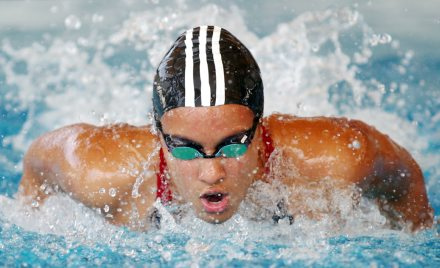[ad_1]
Jasmine Alkhaldi can’t recall competing in a continental age-group swimming competition when she was young—for a good reason.
“I was enlisted in the elite team early,’’ said Alkhaldi, the two-time Olympian with the most medals in the Southeast Asian (SEA) Games.
Brimming with talent and with promising personal clockings in the freestyle and butterfly events to boot, Alkhaldi immediately got a call up to play in the 2010 Asian Games (Asiad) in Guangzhou, China, the youngest Filipino athlete in the Asiad at that time at 17.
Still active with the national squad and now with 28 medals in the SEA Games, the 29-year-old Alkhaldi will be an inspiring figure when the Philippines stages the Asian Age Group Swimming Championships for the first time at Aquatics Center of the New Clark City later this year.
The meet, slated Dec. 3 to Dec. 14, will feature the best swimmers in the continent aged 11 to 18 as a qualifier for the 2024 Paris Olympics.
“Swimmers normally qualify [to the Olympics] not through ranking points, but with their clockings. I’m also making a bid to be there in Paris by meeting the standard times needed,’’ said Alkhaldi.
The three-time Asian gamer who is expected to see action in the coming Asiad in Hangzhou, China, on Sept. 23 to Oct. 8 is proud owner of seven silver medals in the SEA Games and 21 bronzes in a stint that began during the 2013 edition in Naypyitaw, Myanmar.
Alkhaldi, whose mother hails from Cebu and has a Saudi Arabian father, presently holds the women’s national records in the 200 meter, 100-m and 50-m freestyle plus the 100-m and 50-m butterfly events.
The University of Hawaii alum topped the 100-m freestyle in the 2013 SEA Games and was awarded the gold medal only to be retrieved by Myanmar organizers after Thailand lodged a protest.
More than 1,400 swimmers are expected to participate in the 11th Asian Age Group Swimming Championships in New Clark City where the 45-country Asian Swimming Federation (ASF) will also hold its congress and election of officers during the meet.
“We are handling the competition as a caretaker—as long as there’s no legitimate swimming body recognized (by the ASF and World Aquatics, formerly Fina),” said Philippine Olympic Committee president Abraham “Bambol’’ Tolentino. INQ
Read Next
Subscribe to INQUIRER PLUS to get access to The Philippine Daily Inquirer & other 70+ titles, share up to 5 gadgets, listen to the news, download as early as 4am & share articles on social media. Call 896 6000.
For feedback, complaints, or inquiries, contact us.
[ad_2]
Source link




